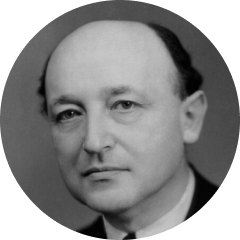Karl Mannheim
(1893–1947)
Karl Mannheim (1893–1947), Hungarian–Jewish sociologist – a central, dominant figure in The Moot whom TSE saluted as ‘my pal’ – was born in Budapest (his father was Hungarian, his mother German). After studying in Budapest, Berlin, Paris and Heidelberg, he became Professor of Sociology and Political Economy at the Johann Wolfgang Goethe University, Frankfurt am Main, 1929–33, before being dismissed in an anti-Semitic purge. Fleeing to the UK, he became (at the invitation of the British political scientist Harold Laski) lecturer in Sociology at the London School of Economics; and from 1941 (at the behest of Sir Fred Clarke) taught sociology at the Institute of Education, University of London, becoming Professor of the Philosophy and Sociology of Education at the Institute, 1945–7: specialising in ‘sociology of knowledge’ and planned democracy. TSE saluted ‘the remarkable influence which Mannheim had come to exercise, within the short period of his residence in this country, upon men of his own generation, not all engaged in the same studies, who had the benefit of his acquaintance. In informal discussion among a small group, he gained an ascendancy for which he never sought, but which was, on the contrary, imposed upon him by the eagerness of others to listen to what he had to say … [H]is talk was always a stimulant to original thought’ (‘Professor Karl Mannheim’, The Times, 25 Jan. 1947), 7; CProse 7, 5–6).
Mannheim’s works include Essays in Sociology of Knowledge (1920); Ideologie und Utopia (1929): Ideology and Utopia (1936); Mensch und Gesellschaft im Zeitalter des Umbaus (1935): Man and Society in an Age of Reconstruction (1940), Diagnosis of Our Time: Wartime Essays of a Sociologist (1943), and Essays in Sociology of Culture (1956). See further Brian Longhurst, Karl Mannheim and the Contemporary Sociology of Knowledge (New York, 1989); David Kettler and Volker Meja, Karl Mannheim and the Crisis of Liberalism (New Brunswick, NJ, 1995); Richard Aldrich, The Institute of Education 1902–2002: A Centenary History (2002).
